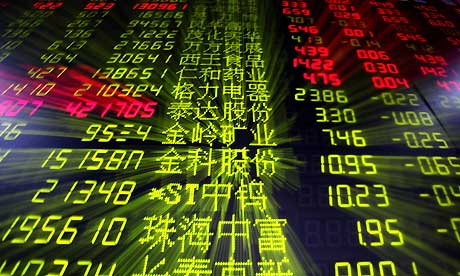Even with China’s stock markets among the poorest performing in the world this year, fund managers betting on the rise of the Chinese consumer are posting strong gains by finding companies that are weathering the broad economic slowdown.
The Shanghai benchmark index is down 9.8% in 2013, slammed by shares of state-owned banks and large steel and coal companies sensitive to slowing growth.
But that masks strong gains in areas from media to health care, as consumers keep up spending.
Most of these stocks are listed in the southern city of Shenzhen, home to many of China’s smaller private companies.
Some of the best performers have been television and film companies.
An index from data provider Wind shows so-called culture and media companies rising 78% this year. An index of software companies has risen 65%, while health-care stocks are up 58%.
“Over the next 10 years, China’s pillar industries will shift from traditional ones—such as steel, cement, coal, and sectors that consume lots of energy—to new industries, especially innovative technology companies that will improve the quality and efficiency of China’s economic development,” said Andy Cao, fund manager for the HSBC Jintrust China Technology Equity Fund, which has jumped 47% this year.
Mr. Cao, who is overweight on sectors including pharmaceuticals, electronics, and media companies, helps HSBC Jintrust Fund Management Co. manage 8.1 billion yuan ($1.3 billion).
Despite the tumble in the main bourse in Shanghai, the 456 domestic funds investing in Chinese shares that are tracked by Morningstar have an average return of 8.6% through July 26, according to the latest data available. While the share market is still dominated by retail investors—and regulators restricting how large pension and insurance funds can invest—the performance still shows how the nascent fund-management industry is performing amid slowing growth.
“This is a market that is at the emerging stage, and this creates opportunities for us. Because the market is speculative, it can be inefficient,” says Thomas Deng, chief investment officer and deputy CEO of Invesco Great Wall Fund Management Co. in Shenzhen, where the average return for its funds is up 27% this year. Mr. Deng helps manage 48.6 billion yuan.
In addition to fast-rising industries, there is a preference among professional investors to switch away from large state-owned enterprises to companies without government ownership.
“Many state-affiliated firms are less nimble, less competitive than private companies,” said Haijun Wang, portfolio manager for Fullgoal Fund Management Co.’s Fullgoal High Tech Industry Fund in Shanghai.
The fund, up 42% year to date, is invested in about 25 technology-related stocks listed in bourses including Shanghai and Shenzhen.
Mr. Wang says one of the fund’s largest holdings is in Shenzhen-listed firm Shenzhen Inovance Technology Co. Ltd, which supplies industrial automation products to high-end equipment manufacturers, whose stock has soared 69% year to date. He says he bought the shares based on the trend that China is following in the footsteps of developed nations in substituting automated labor for manual labor.
“Salaries for Chinese engineers are getting higher,” supporting a greater role for robotics, Mr. Wang says.
In particular, the demand for growth companies has translated into spectacular performance on the ChiNext, a board in Shenzhen for startups that began in 2009 with just 28 companies. The market now is home to more than 300 listed companies and is up 65% this year. Shenzhen’s bourses llists companies with a combined value of $1.3 trillion, compared with Shanghai’s $2.3 trillion.
“Mutual-fund investment is going from traditional sectors to newer sectors on the ChiNext,” said Jian Qiang Wang, co-manager of Rongtong Fund Management Co.’s RongTong ChiNext Index Enhanced Fund, a fund that loosely tracks stocks listed on the startup board.
Reflecting the makeup of the broader index, the fund’s largest holdings are in sectors such as media, health care, machinery, and power and clean technology.
DANIEL INMAN and CHAO DENG
WSJ
 Asia Finance News Asia finance news, banking, market analysis, business, Forex, trade, Cryptocurrency as it is happening in Asia. Trusted gateway for Asian financial news.
Asia Finance News Asia finance news, banking, market analysis, business, Forex, trade, Cryptocurrency as it is happening in Asia. Trusted gateway for Asian financial news.


